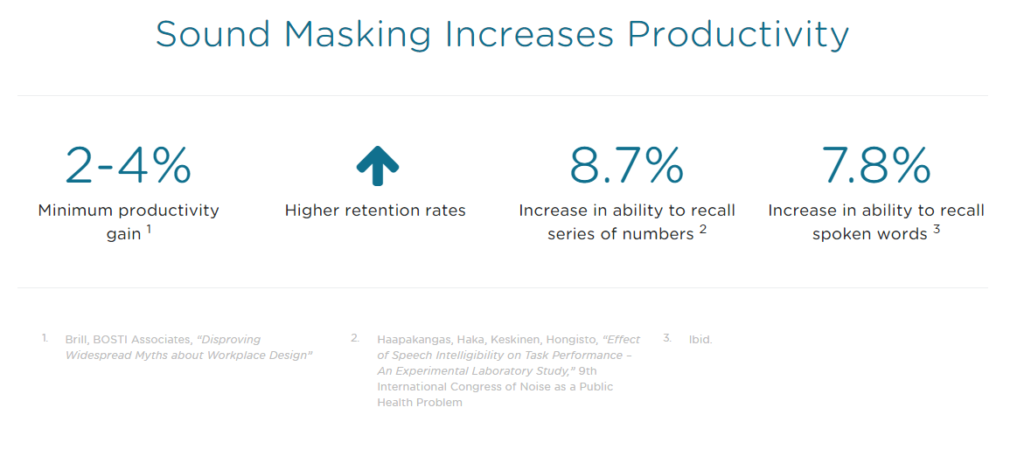Protecting sensitive information is important for businesses of all sizes. Most companies work hard to secure their premises with video, protect their network with managed services as well as antivirus, and protect entrances to the building with door and access control. They are adequately prepared for most threats but how protected are the conversations that take place inside the building?
- Are the employees and customers’ conversations audible for anyone to hear?
- Can others listen to confidential discussions in a conference room?
- Do employees struggle to maintain focus due to noisy environments?
Accounting for employee and customer conversations is important to the business if sensitive information is discussed. These discussions could be audible to other customers for malicious use, including identify theft. As a business, customers trust that they will keep their information private and secure. Executive team briefings and other business critical information that should remain behind closed doors, potentially could be heard by the wrong parties, if the proper steps are not taken. 53% of employees reported having overheard confidential company information at the office.* Open floor plans arevery susceptible to sound distractions as these environments are typically shared with very little barriers between everyone.
There is a cost to ignoring these distractions. Inadequate acoustic design will cause your employees to overhear confidential conversations they should not and have their own conversations overheard by others. The distractions can cause productivity to be negatively impacted, which in turn affects the revenue for the business. For regulated industries such as healthcare and finance, private client information is required to be protected at all times. Companies can be deemed liable for private information being heard by the wrong parties and even found as out of compliance in some instances. If found out of compliance, companies can face fines, suspension or even be shut down.
 Sound masking is a great solution for companies looking to protect their conversations in the office. Sound masking allows businesses to protect their conversations through a white noise played through a ceiling emitter. The white noise adds a level of background sound designed to reduce noise distractions and make conversations more difficult to understand. The frequency of the emitted sound can be adjusted based on the level of confidentiality needed and zoned appropriately to custom areas of the office.
Sound masking is a great solution for companies looking to protect their conversations in the office. Sound masking allows businesses to protect their conversations through a white noise played through a ceiling emitter. The white noise adds a level of background sound designed to reduce noise distractions and make conversations more difficult to understand. The frequency of the emitted sound can be adjusted based on the level of confidentiality needed and zoned appropriately to custom areas of the office.
Sound masking is great for organizations who:
- Need protection of sensitive conversations, internally and with customers
- Experience loss of productivity due to distractions
- Looking to enhance acoustic environment
- Must be compliant in protecting client information
Safeguarding client information is important for businesses as they strive to remain credible, trustworthy, and compliant. Sound masking provides an avenue for organizations to fall within these guidelines as well as create a supporting acoustic solution for their employees.
* Cambridge Sound Management, “Sound Masking 101“

